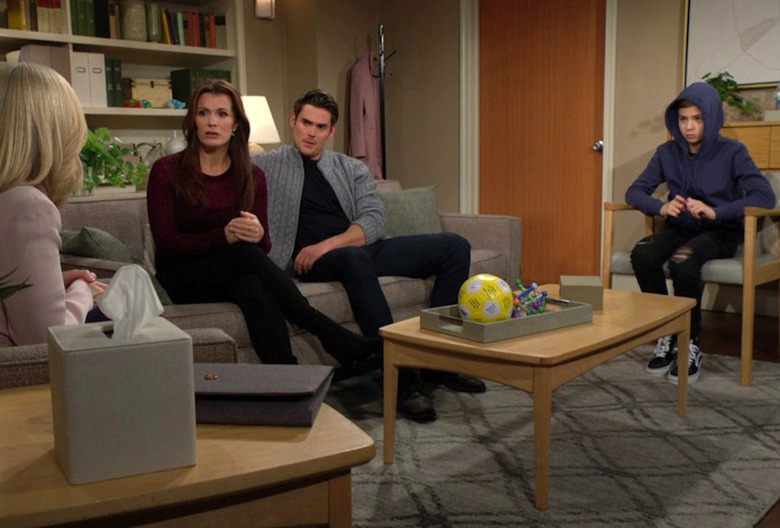Young And Restless Boss Opens Up About OCD Story, Previews 'Emotional' But 'Gratifying' Journey Ahead
National Children's Mental Health Awareness Month is underway, and one of the most important measures of success for The Young and the Restless' storyline about young Connor Newman's OCD is that it has helped some viewers identity the disorder within their own, real-life orbits.
"We've gotten emails, and we've seen social media posts where [viewers] have said, 'Now I have a name for it, now I understand what's going on with my loved one,'" Y&R executive producer and head writer Josh Griffith tells TVLine. In telling this story, "That was really the biggest goal for me — to be able to show this to people so that they go, 'Now I know what I'm dealing with,' and know what to do moving forward."
Griffith participated on Tuesday at "Changing the Narrative: Children's Mental Health in Entertainment & Media," a panel presented by The Kids Mental Health Foundation and the Mental Health Storytelling Coalition. The discussion, moderated by Ashley Kolaya (director of the Mental Health Storytelling Initiative), also featured Dr. Whitney Raglan Bignall (associate clinical director of The Kids Mental Health Foundation), Noopur Agarwal (VP of social impact for Showtime/MTV), Ross Szabo (wellness director at the Geffen Academy at UCLA) and Kids Mental Health Foundation celebrity champion Alexandra Daddario.
In discussing the genesis of Y&R's OCD storyline, Griffith shared during the panel how his own daughter struggled with the disorder for years, yet was not actually diagnosed until age 26.
OCD, per the Mayo Clinic, presents itself via patterns of unwanted thoughts and fears known as obsessions, which in turn lead you to do repetitive behaviors (called compulsions). Obsessions and compulsions get in the way of daily activities, and can cause great distress.
"It was really important to me" to tell this story, Griffith told TVLine after the panel, "because there's been such a misunderstanding of what OCD is — it's often the brunt of a joke, 'Oh, my OCD is acting up today!' — when it's so much more complex and terrifying than that."
Griffith shared how as he breaks the OCD story, he runs it by The Kids Mental Health Foundation to vet. If there are notes, "More than anything it's about, 'Here's how the clinician would react....' 'This is a more appropriate way to speak to the parents or to the child in the therapeutic environment...,'" he shared. But for the most part, "I had firsthand experience I was drawing from, so it was gratifying to get feedback from them saying, 'This is very realistic.' And I'm like, I know, I've lived it."
In the CBS serial's storyline, Judah Mackey plays tweenage Connor, while nine-time Daytime Emmy nominee Melissa Claire Egan and Daytime Emmy nominee Mark Grossman play his loving, concerned parents, Chelsea and Adam.
"Fortunately the parents are very well-situated on the canvas, so we were able to not only explore the ramifications for Connor and Adam and Chelsea, but for their friends and family, too," Griffith noted. "Their dealing with this affected the way they dealt with the other stories, so there was a wonderful ripple effect."
All three of the involved actors have availed themselves of resources, Griffith said, to best and most accurately approach the storyline.
"This is the second mental health story we've told with Missy — we did an attempted suicide for [Chelsea], two years ago — so she's very, very into doing the research," the EP said. "And Mark has done so, too. They've been working with [The Kids Mental Health Foundation], as has Judah."
"It's a privilege to tell this story," Egan shared with TVLine. "Mental health affects so many children, it's been important to shed a light on that and help not only children feel seen, but their parents as well. I applaud Josh and our writers for always wanting to dig into real issues, and help real people."
What's next for Connor's OCD storyline, which kicked off earlier this year?
"It's going to be a very emotional and ultimately gratifying journey to a better place for Connor psychologically," says Griffith. "But it only started in March, and we've got a good ways to go."
